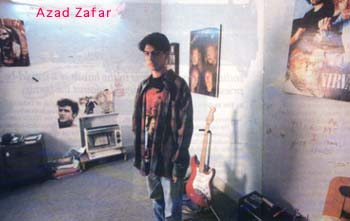since November 30, 1998
|
|
|
Somebody in the government was clearly not a fan. Junoon, which translates as Frenzy, uses soaring guitar riffs to deliver a Sufi message of mystic harmony. It was Junoon's misfortune to have preached that theme in India soon after that country tested its nuclear bomb. Young Indians loved it and waved posters saying WE WANT CULTURAL FUSION, NOT NUCLEAR FUSION at a packed New Delhi concert. Back in Pakistan, news of Junoon's peaceful overtures was heard as treason. Pakistani Premier Nawaz Sharif's government already disliked the group: after one of its earlier songs took a swipe at corrupt politicians, it banned state television from letting anyone with long hair and jeans perform. This time, concert organizers were effectively bullied into canceling the band's engagements. All they had done was to "denounce the concept of an arms race," says guitarist-songwriter Salman Ahmad. "In Pakistan we don't have clean water, health or employment. How can we afford a nuclear bomb ?" This complaint is heard across the border too. In India,
as in Pakistan, young What unifies the younger generation of Indians and Pakistanis is a growing disillusionment with their leaders. After the nuclear tests, these frustrations have deepened. With blinding clarity, the nuclear blasts illuminated the tragedy of how two nations had diverted their undeniable talent and resources toward fratricidal destruction, neglecting the worth of their own people. The older generation -- especially politicians in both countries -- still carry the scars and ancient prejudices that re-surfaced when the subcontinent was torn apart in 1947. The old hatreds have dimmed, just slightly, and the young today may not want to pursue their elders' vendettas much longer. Satellite TV has freed them from the venomous distortions dished out by the state-run networks in both countries. A powerful curiosity exists about The Other, like twins wrenched apart at birth. At the Wagah border checkpoint in Punjab, picnicking families gather to gape and wave to Pakistanis waving back from the other side of the barbed wire. A Pakistani teenager who had joined the Muslim insurgency in Kashmir was caught by Indian policemen recently after he had infiltrated across the border. His mission: to see a movie with his favorite Bombay star.
Lately, the fighting in Kashmir has spilled onto that preserve of young people, the Internet. Cyber-saboteurs broke into a website set up by the Indian army to explain its policies in Kashmir. The hackers diverted visitors to a pro-guerrilla site containing slogans like STOP THE INDIANS ! and SAVE KASHMIR ! The Internet has proved the perfect platform not only for Indian and Pakistani propagandists but also for anyone with rabid views. Keying in that incendiary word - Kashmir - on a browser can yield nearly 80,000 web pages, some with gory pictures, plus dozens of chat sites. Says U.S-based Internet consultant B.G. Mahesh, who runs a website on India: "The Net at times has increased hatred between us." So has cricket, a game popular among young people of both countries. An Indo-Pak contest invariably draws the biggest crowds, finds the most sponsors and is a big money-spinner for pavement bookies. But special security is required when the teams venture across the border. In India, a match against Pakistan can sometimes lead to ugly taunts against local Muslims. The usual jibe is that every Indian Muslim secretly wants Pakistan to win, even though India's team captain, Mohammad Azharuddin, is himself a Muslim. Bal Thackeray, leader of the radical Shiv Sena party in Bombay, refuses to let Pakistan play in his cricket-mad city. "Sport is hyped up as being macho," says writer Urvashi Butalia. "And cricket is the only outlet for some people to express their prejudice." In Pakistan, the sense of helplessness among young people is especially pronounced. Those who can leave the country do so. On the verge of bankruptcy, Pakistan's moribund economy offers little hope for young job-seekers. Demographer Numan Ijaz estimates that over the past 20 years, as many as 40,000 professionals have migrated abroad. Those left behind without money or influence in this feudal society are veering to perilous extremes. Over the past 10 years, heroin consumption has doubled, primarily among teenagers. Police records show the average age of murderers and bandits is dropping. Many are left with bleak outlooks. "My biggest fear is that one day I will open my front door and a terrorist will shoot me in the head," says Azad Zafar, a 17-year-old schoolboy.  Other boys become religious revolutionaries. With the state unwilling to provide much money for education -- nearly 30% of the budget goes for defense -- Pakistanis are enrolling their young sons in free Koranic schools. After six years of strict Islamic upbringing, many of these teenagers are sent to Afghanistan for arms training. Then they either join the Taliban militia or go to fight the Indians in Kashmir. Fired by Islamic fervor, many want to bring the holy war back to Pakistan. They assassinate mullahs from rival Muslim sects and occasionally fire off guns during religious party rallies. Muslim militant Naveed Illahi rants: "There is Westernization. There is immorality. These rulers are all corrupt. They all deserve to be hanged." Lately, a new scare plagues Pakistan's elite: rumors of a gang of youths said to prowl shopping centers and cinema halls armed with needles carrying the HIV virus, targeting women wearing Western dress. With such fearmongering still prevalent on both sides of the sub-continent, it may be generations before Junoon and other young messengers of tolerance are heeded. With reporting by Meenakshi Gangly/Bombay, Ghulam Hasnain/Karachi, Syed Talat Hussain/Islamabad and Saritha Rai/Bangalore |